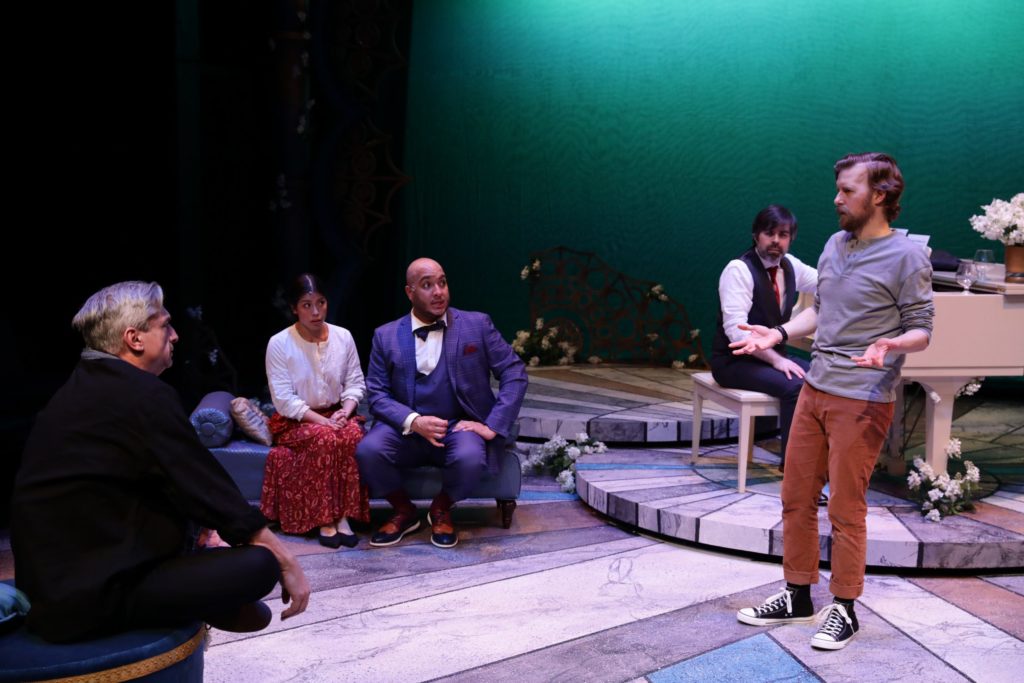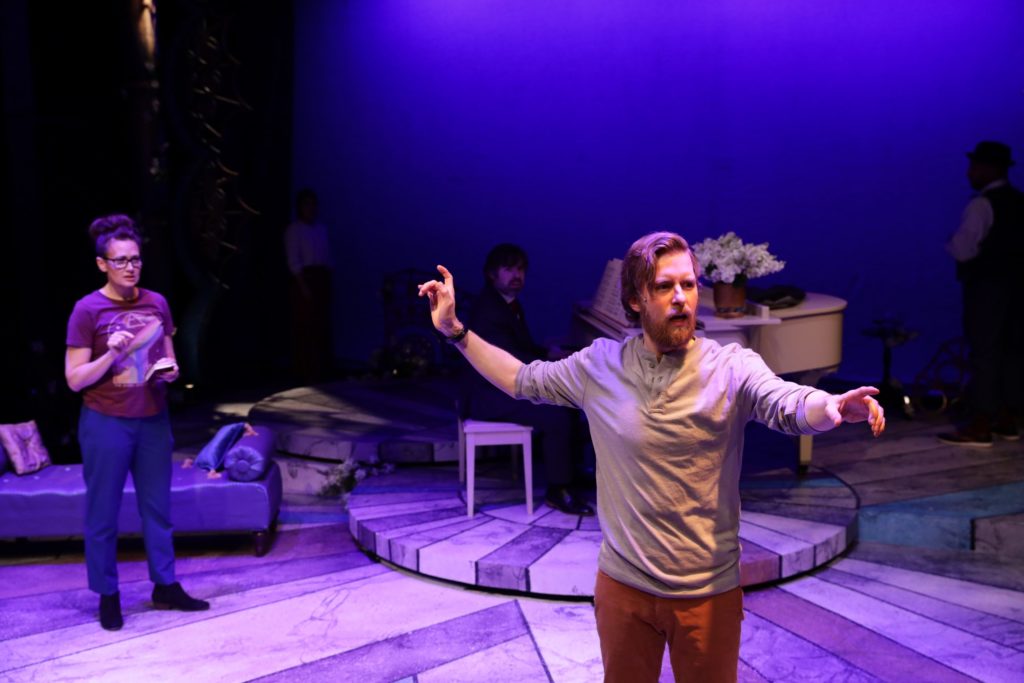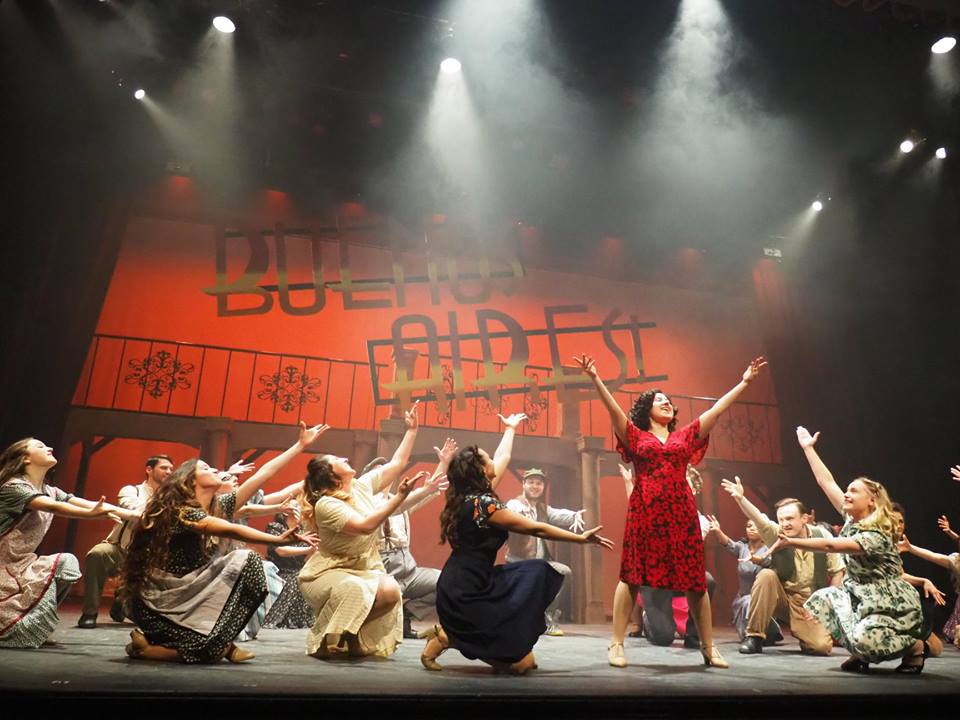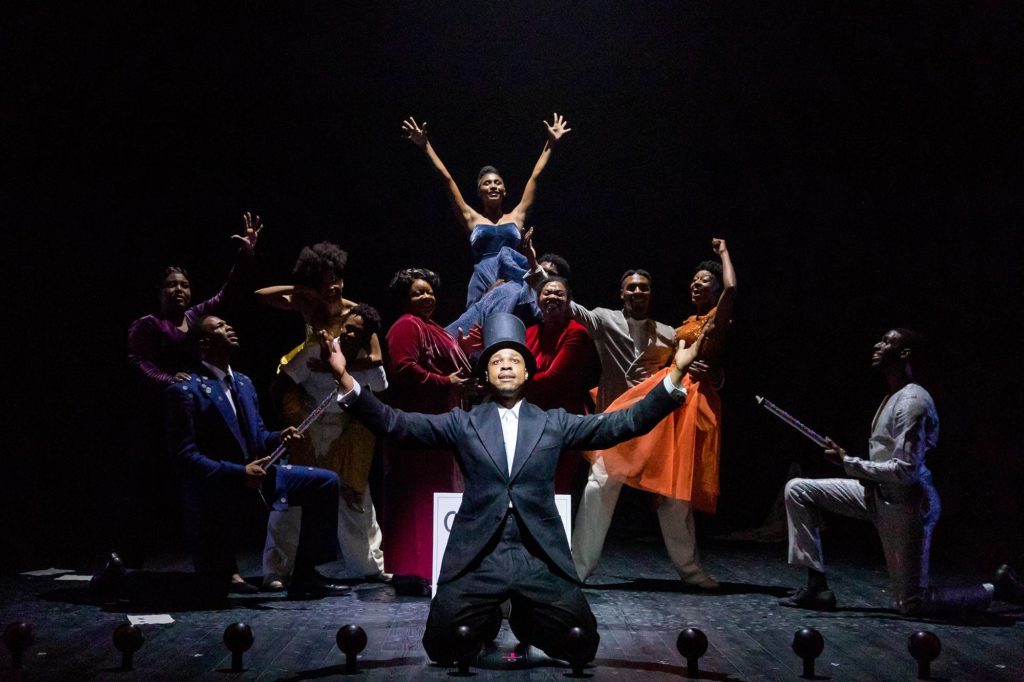
Photo by Mark S. Howard.
Presented by the Lyric Stage of Boston
Music, lyrics, book, and orchestrations by Dave Malloy
Directed by Courtney O’Connor
Music direction by Dan Rodriguez
Dramaturgy by Megan Jepsen, Marieska Luzada
Orchestra: Bethany Aiken, Mindy Cimini on keyboards
Jan. 6 – Feb. 5, 2023
Lyric Stage
140 Clarendon Street
Boston, MA 02116
RUNNING TIME: APPROXIMATELY 2 HOURS AND 10 MINUTES, INCLUDING A 15-MINUTE INTERMISSION.
Critique by Kitty Drexel
BOSTON, Mass. — As a girl I was introduced to the music of Sergei Rachmaninoff via the 1996 Geoffrey Rush movie Shine about pianist David Helfgott. I remember thinking Rachmaninoff’s music was so wondrous that it would be worth going a little mad to play it so beautifully.
It is terrifically easy for innocent children to romanticize the mental health crisis of adults. I’m an adult now with two degrees in classical music, but I don’t entirely disagree with my teenage self.
Preludes is Arcade Fire’s Win Butler (minus those pesky sexual assault allegations) meets contemporary musical theatre that arbitrarily skips between the centuries. It’s the story of poor, little rockstar composer Rach (Dan Prior) who suffers from debilitating writer’s block. Rach is seeing Dahl (Aimee Doherty), a hypnotherapist, to break his block and reach the great heights of success again. Rach shares his journey with his fiancee Natalya (Kayla Shimizu), opera singer Chaliapin (Anthony Pires Jr.), and assorted Russian intelligentsia (Will McGarrahan). Dan Rodriguez kicks ass as Rachmaninoff.
I’m of two minds about Dave Malloy’s Preludes at the Lyric Stage: it’s whiny and navel-gazy; and, it directly attacks the artist’s universal conundrum of creating art that is both valuable and entertaining. The Lyric’s production does not negate itself by doing both simultaneously.
This is what it is to be an artist. We desperately want to be hired but know that we may never reach our full potential. Every artists has that one brilliant friend who gave up because they couldn’t reconcile all that excruciating, costly, invisible work for lack of career recognition.
Audiences don’t often get to see artists complaining. As in the rest of life, artists can complain and still feel truly grateful for our discipline and talents. We bitch to our therapist, pick ourselves up again and get back to our art. In Preludes, Rach doesn’t get back to it because he can’t. Artists are people too.
Audiences will recognize Dave Malloy from his biggest success Natasha, Pierre & The Great Comet of 1812. Preludes is a great departure from Great Comet. For one thing, it’s mercifully shorter. For another, it has more than the one melody played over and over and over.
Malloy’s original compositions in Preludes have tight, exposed vocals. Sometimes the vocals are a capella. He incorporates techno elements on two keyboards. Malloy requires vocals to sing lines independent of the techno music.
The Preludes cast meets Malloys demands and conquers them. Whatever one might think of the script or the music, the cast does a great job. Kayla Shimizu has both an expressive legit voice and impressive, cathartic-sounding mix. Anthony Pires Jr. bounds across the stage as Chaliapin. Will McGarrahan wears many hats while wearing the same shirt. Aimee Doherty charms as Dahl.
Dan Prior rides waves of Rach’s mental health to the big breakdown in Act 2 like a professional surfer. Prior and director O’Connor paced both acts uncannily well to preserve Prior’s energy and the audience’s patience. By the time Rach is ready to tell his Big Tale, we’re ready to hear it.
Music director Dan Rodriguez is the soft-focus star of Preludes. He plays piano center stage, rarely looks up from the keyboard and utters few words over the course of the two-hour production. He hovers omniscient, observant, seen and unseen.
The actors drift around Rodriguez weaving Malloy’s story, but it’s Rodriguez who does the impossible work of interpreting Rachmaninoff’s genius and then threading Malloy’s compositions under and through. Then Malloy asks his music director to conduct from the stage. And then Malloy asks him to sing.
Rodriguez is a known, beloved music director in Boston. Rodriguez has the trust of his cast, his unseen orchestra, and the audience. We believe his Rachmaninoff and in his skill at the piano. This may be his most challenging role to date, and he meets it with aplomb. He takes a risk coming in front of the curtain. It pays off.

Photo by Mark S. Howard.
The “Who’s Who in Preludes” playbill article adds a thoughtful touch to the playgoing experience. It puts nine faces to nine famous name drops in the show and gives the audience something to consider during the intermission. (Such as how Tolstoy maintained such an exact yet plush eyebrow to mustache hair ratio). We’re introduced to how each knows Rachmaninoff and why they are important to Preludes. More dramaturgy is HERE.
For those of you who know what it is to have spoken with the muses and be abandoned by them, it is no small thing to have experienced their presence. Attempting to call them back is painful, embarrassing, and painfully embarassing. Malloy’s work represents his experiences. It isn’t universal. Be kind.
People want/need art but don’t want to pay artists a living wage. Preludes asks an audience to see an artist as a person, an imperfect, breakable person with more flaws than genius or friends. We ask a lot of our artists. Preludes asks us to give a little more than money and time.

